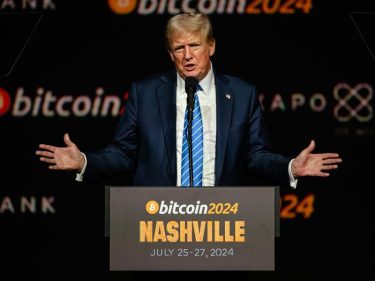AUSTIN, Texas – You might think, given Mike Novogratz’s penchant for wrestling, that he’d pick a team when it comes to politics and take his opponents to the mat. After all, we’re talking about the guy who once got a tattoo of doomed-to-fail stablecoin project Terra/LUNA – he doesn’t mind taking sides. But instead, Novogratz describes himself as a “radical centrist.”
“I am broadly a center-left Democrat … but I’ve donated to Republican candidates,” Novogratz said Thursday on the Main Stage at Consensus 2024. In other words, if Novogratz has a team, it’s crypto, making the Galaxy Digital CEO a kind of “single issue” voter.
There are many voters in the U.S. who are increasingly concerned about how the asset class has become a political wedge issue. So many so that it appears that the laser-eyed focus of bag holders, perpetual industry lobbying and recent endorsement by former President Donald Trump have helped soften many Democratic officeholders’ stance on crypto.
“There’s been a seismic shift in the political landscape in the last two weeks.” Novogratz said. “I’ve been in D.C. trying to tell people this is a bipartisan issue,” but over the years the Democrats seem to have lost the plot. Or as Novogratz said by way of comparison, “the Democratic party was the party that doesn’t like dogs.”
Indeed, the legislative and regulatory advancements of recent weeks – including the House and Senate vote to repeal the maligned accounting bulletin SAB121, the House passing a crypto bill, major progress for ETH ETFs and President Joe Biden’s reported outreach to crypto firms looking for guidance on saner policy – happened bing-bang-boom.
“I don’t know what happened,” Novogratz said. “It certainly feels like someone from the White House called Mr. Gensler [SEC Chairman] and said, ‘You got to change your stance,’” Novogratz said. Likewise, “Elizabeth Warren had a huge sway over presidential politics,” but unfortunately for the Massachusetts Senator she got into “hot water with this giant group of crypto voters in a very tight election year.”
However, Novogratz did note that the Democratic Party is not a monolith, and that many have been calling for positive regulation and consumer protections, including New York Representative Ritchie Torres and Democratic Leader of the House Hakeem Jeffries, who “got it.”
Echoing Sen. Tom Emmer (R–MN.), who said yesterday that while Congress appears increasingly willing to pass crypto legislation the Senate remains a potential roadblock, Novogratz said that the most important politician in office right now is Debbie Stabenow (D–MI), who chairs the agriculture committee and serves on the finance and budget committees, who may determine when votes are held.
Part of what is driving these recent political changes is the sheer amount of money entering campaigns and all but ensuring crypto becomes an election issue. Novogratz estimated that as much as $250 million has already been directed to crypto-focused Super PACs, which have become “de facto” Republican.
The wonderful thing about any decentralized movement is it takes an army” to take on,” Novogratz said, highlighting the number of high profile people like Coinbase founder Brian Armstrong “constantly pushing” for reforms. “There are tons of people who run companies and have vested interests” that have moved the needle. “I like to think Galaxy is part of that, but by no means can we take a lot of credit.”
So, assuming a re-empowered crypto industry becomes a bone fide political force, what can the world expect to happen?
Well, assuming Biden reneges on his decision to veto Congress’ decision to repeal the Security and Exchange Commission’s SAB121 accounting rule, that would mean a number of TradFi custodians like State Street and the Bank of New York could start custodying crypto. And they will, Novogratz said.
“You will see a stampede of firms like Citi and Jeffries entering into this space. I’m hoping in some ways it’s delayed a little so guys like us can build our muscles stronger,” he added. Though baby boomers, which Novogratz called the wealthiest age group in the history of the planet with $45 trillion in assets, may not be immediately convinced on the merits of crypto. “That’s a 10-year conversation.”
But because the “government can’t stop spending money on the left and on the right,” the narrative of crypto will continue to take hold. “Donald Trump and Joe Biden normalized … profligate fiscal policies,” he said.
Relatedly, if crypto’s political influence continues to grow it will likely be able to exert pressure to change unfavorable rules. This might be the case for ETH ETFs, which at launch will likely not be able to stake the underlying asset in the funds. He estimates that if enough people gain exposure to ETH, within 12 to 24 months of launch, “they will change the rules to allow staking.”
“You’d rather get a yield than not get yield,” he said.
Then there is the matter of the plethora of open and expected SEC lawsuits. Novogratz expects that many of these cases will be thrown out due to a confluence of factors, including the nearing end of Gensler’s term, the regulatory uncertainty around market structure (i.e. whether tokens are securities or commodities) and fears of administrative overreach.
“Common sense will take over,” he said. “It really does feel like the assault on crypto companies over the last three years was one of the most un-American things I’ve seen. It was politically motivated, in my mind, and I don’t think it was good for the country. And I think most civil servants and politicians believe that, too.”
Finally, there are practical considerations for Galaxy, which is a publicly traded company in Canada that is looking to list in the U.S. Novogratz explained that the firm failed to file its paperwork while Trump was in office, and has been trying “to go public literally since the very beginning of the against Gensler-Biden SEC.”
Explaining the “long and arduous process,” which has cost the firm an estimated $25 million, feels like it is accelerating (and that it was never clear why so many firms were being “slow rolled), Novogratz gave a cautiously optimistic estimate that by early next year Galaxy might enter the U.S. as a public company.
“It’s been a complete and total disadvantage not having access to the world’s greatest capital markets,” he said. With any luck, the political headwinds for crypto firms have come to an end.




